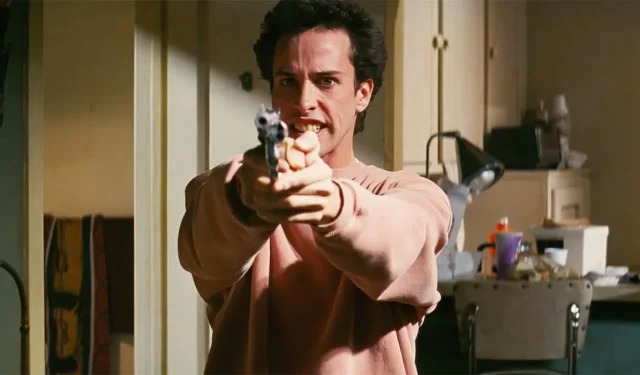
A Firearms Expert Analyzes the Survival of Jules and Vincent in Pulp Fiction
The iconic characters Jules Winnfield, portrayed by Samuel L. Jackson, and Vincent Vega, played by John Travolta, are celebrated figures in Quentin Tarantino’s acclaimed film, Pulp Fiction. While their witty exchanges—such as Vincent’s intriguing commentary about a “Royale with Cheese”—are often fondly remembered, the duo also remains notable for their remarkable ability to escape perilous situations.
Decoding a Miraculous Moment
In a recent video by Insider, firearms expert Patrick McNamara sheds light on a pivotal moment early in the film when Jules and Vincent are shot at close range. To their astonishment, none of the incoming bullets strikes them. While Jules refers to this as a miracle, McNamara attributes their survival to a lack of skill on the shooter’s part. He provides an insightful analysis, emphasizing that inexperience on the part of the assailant played a significant role.
It probably wasn’t divine intervention that saved Sam Jackson and John Travolta’s lives. It was probably just really poor marksmanship. What people might think is, “Well, why did he miss that close?”Not uncommon. It’s not an easy thing hitting somebody with a pistol, even at close distance. If you’re not trained, and you’re just mushing and going a million miles an hour on that trigger, you’re not hitting diddly squat.
It’s a movie where you have to suspend reality. These are gangsters. They’re not gun guys. They’re gangsters. So let them shoot strong hand and just blaze away.
Understanding the Realism Behind Their Survival
Jules and Vincent’s Lucky Escape
McNamara’s viewpoint contrasts with Vincent’s belief that their escape from the gunfire was purely coincidental. According to McNamara, the presence of chaotic circumstances and the plight of the shooter—a character driven by desperation—contributed to their survival. The scene cleverly balances elements of comedy and realism, serving as proof that even in the world of gangsters, the unpredictability of human behavior can lead to spectacular outcomes.
Importantly, McNamara’s observations underline that Pulp Fiction’s characters are not well-trained marksmen; they represent archetypical gangsters who operate under extreme pressure. This portrayal lends a heartfelt authenticity to the film’s narrative, making the near-miss plausible. The desperate gunman, lacking the finesse of a trained shooter, ultimately mirrors the reckless nature of the lifestyle depicted in the movie.
Our Perspective on McNamara’s Insights
Enhancing Appreciation for Pulp Fiction
Nearly three decades after its release, Pulp Fiction continues to receive high praise from critics and audiences alike. The interplay between realism and the exaggerated antics of its vibrant cast amplifies the film’s signature style. The realistic depiction of their escape enriches the chaotic environment where poor decisions fuel conflict, leading to a memorable cinematic experience.
In this case, Jules and Vincent’s survival story hinges upon the unfortunate marksmanship of their aggressor, further solidifying the notion that Tarantino’s storytelling cleverly weaves the unpredictable nature of human behavior into the action film narrative.
Source: Insider




Leave a Reply